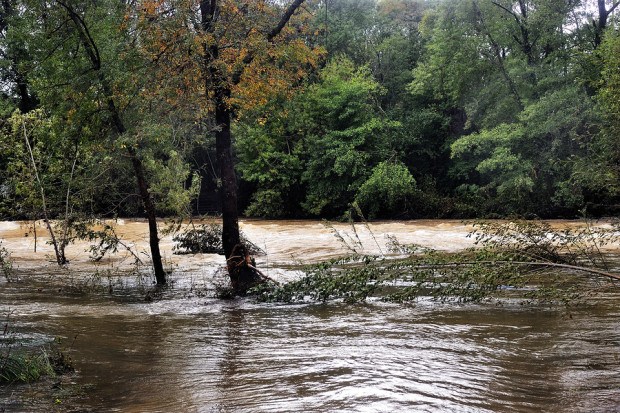The House Financial Services Committee on Thursday passed two bills to reform the National Flood Insurance Program (NFIP). One is a broad reform proposal that seeks to encourage more private insurance and move the program toward actuarial-based rates, while the other addresses premium credits for mitigation efforts and underwriting of urban properties.
Committee Chairman Rep. Jeb Hensarling (R-Tex.) said the committee will reconvene on June 21 to consider additional bills to reauthorize the NFIP. Plans call for the markup of the other bills to begin at 10 a.m. Eastern in open session.
The NFIP will expire on September 30 of this year unless Congress acts to renew it.
The property/casualty insurance industry still has some qualms about the major bill advanced by the committee because it cuts the reimbursement allowance for private insurance carriers and agents participating in the program.
The major bill passed is the 21st Century Flood Reform Act of 2017 (H.R. 2874), which was introduced by Rep. Sean Duffy (R-Wis.), chairman of the House Financial Services Subcommittee on Housing and Insurance. It passed by a vote of 30-26. It is a broad proposal that incorporates many of the ideas in individual bills. It aims to put the NFIP on stronger financial footing; improve flood mapping, mitigation efforts and claims handling; and encourage greater private insurer participation in the market.
The original Duffy measure contained a provision lowering the current 31.9 percent reimbursement that insurers participating in the Write Your Own program can receive to a maximum of 25 percent. That provision was opposed by major property/casualty insurance trade groups including the National Association of Mutual Insurance Companies (NAMIC), Property Casualty Insurers Association of America (PCI), American Insurance Association (AIA) and Independent Insurance Agents & Brokers of America (Big “I”). Agents commissions are paid out of this carrier allowance.
The committee has now modified that provision so that the reimbursement to WYO carriers would be lowered to a maximum of 27.9 percent over three years. That action was a step in the right direction but did not totally satisfy all P/C insurance lobbyists.
The National Association of Mutual Insurance Companies (NAMIC) told Insurance Journal that it now supports the legislation. NAMIC called yesterday’s vote “an important first step toward a stronger National Flood Insurance Program and a more competitive flood insurance marketplace.”
Tom Santos, AIA vice president for federal affairs, said AIA now also supports the bill as reported out by the committee but stressed the work isn’t done: “AIA supports a long-term authorization of the NFIP, and believes that yesterday’s Committee action makes continued progress towards that objective. We appreciate the Committee’s work on this important issue and we look forward to continuing to work with Congress to secure reauthorization of the NFIP.”
However, other insurance groups were not willing to go so far as to say they support it.
The Big “I” said it is now “neutral on the package of bills” after working with committee leadership and the three major P/C insurer trade associations on amending the WYO reimbursement rate and other provisions in the bill, according to Charles Symington, Big “I” senior vice president of external and government affairs.
Nat Wienecke, PCI senior vice president, federal government relations, also stopped short of lending support to the measure. “The committee made a lot of good progress yesterday. PCI is fully supportive of the direction the committee is taking both from a broad policy perspective and on the individual components,” the PCI representative told Insurance Journal.
The National Association of Professional Insurance Agents (PIA) has maintained its opposition to the measure.
Second Bill
The committee also approved the National Flood Insurance Program Policyholder Protection Act of 2017 (H.R. 2868), sponsored Reps. Lee Zeldin (R-N.Y.) and Carolyn B. Maloney (D- N.Y.). It passed 53-0. This bill seeks to limit premium rates and require FEMA to conduct a study to analyze the unique characteristics of flood insurance coverage of urban properties. It would set a maximum premium for 1-4 residential properties at $10,000 and provide for mitigation credits for certain mitigation activities unique in urban area, such as elevating their homes, adding porous foundations, or moving boilers to a higher floor. The bill also calls for FEMA to better cover co-op units within NFIP.
“These bills put the National Flood Insurance Program on a path toward actuarial soundness where all will be protected, no one will be denied a policy, all will benefit from competition, the NFIP will be sustainable, and the national debt clock will spin a little less rapidly,” said Chairman Hensarling in prepared remarks after the session.
The ranking Democrat on the panel, Rep. Maxine Waters (D-Calif.), had urged the committee to take more time and consider more bipartisan approaches. She said Democrats are concerned about raising premiums too much and too quickly. She warned that “in many respects the package of bills would actually make matters worse by restricting coverage, increasing costs, and opening the door to cherry-picking by the private sector.”
*ˆThis story appeared previously in our sister publication Insurance Journal.





















 State Farm Inked $1.5B Underwriting Profit for 2025; HO Loss Persists
State Farm Inked $1.5B Underwriting Profit for 2025; HO Loss Persists  Reinsurance Program Could Wipe Out Need for Calif. FAIR Plan: Legal Exec
Reinsurance Program Could Wipe Out Need for Calif. FAIR Plan: Legal Exec  State Farm Mutual to Pay $5B Dividend to Auto Insurance Customers
State Farm Mutual to Pay $5B Dividend to Auto Insurance Customers  10 Do’s and Don’ts of a Smart ORSA Report
10 Do’s and Don’ts of a Smart ORSA Report 


